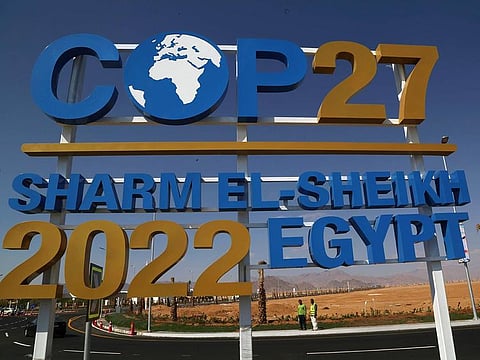The critical importance of COP27
Sharm Al Sheikh summit is crucial to the future of this planet

Leading experts on climate science will gather this week in Sharm Al Sheikh in Egypt with world leaders and officials to try and set out a road map on how to keep the warming of the planet to just 1.5 degrees Celsius — the critical pressure point to prevent irreversible and permanent damage to our climate. The stakes for success in the United Nations-led COP27 could not be higher.
Already we are seeing the devastating effects of climate change on our planet and in nations across the world. Weather events are becoming more extreme as a result of the warming of our planet from our continued use of fossil fuels and other activities and lifestyles that exacerbate the greenhouse effect the world over.
This gathering in Egypt now marks the last best chance to meet that 1.5 degree ceiling. Beyond that, rising temperatures will have severe consequences that will reduce ice caps, raise sea levels, forever change the patterns of currents in our oceans, alter our natural environment and bring about devastating impacts on our flora and fauna, as well as putting even more life at risk from severe and unpredictable weather events.
Vanguard of environmental change
For Egypt, hosting COP27 is a significant vote of confidence, recognition that its government is committed to being at the vanguard of environmental change. Holding the presidency of COP27 shows the nation’s clear recognition of the gravity of the global climate challenge, and its appreciation of the value of multilateral and collective action as the only means to address the challenge of our times.
Across the wider region, the effects of climate change are seen in searing temperatures, more severe storms, greater flooding and dwindling natural water supplies that affect food production and those engaged in agriculture.
Throughout, the UAE has continued to lead the way in reducing and diversifying from fossil fuels, development and committing to clean and green energy sources.
A few days ago, the UAE and the US reached an agreement to spend $100 billion on clean energy projects, with a goal of adding 100 gigawatts globally by 2035. Under the initiative, the UAE and the US will provide technical, project management and funding assistance for commercially and environmentally sustainable energy projects in other countries.
It’s precisely these types of initiatives that will help nations reduce their dependence on fossil fuels, decrease their carbon footprints and help reach that 1.5 degree target essential in preventing our planet from becoming too warm too quickly.
Last year, at COP26 in Glasgow, countries agreed for the first time to “phase down” coal production and trim other fossil fuel subsidies. Voluntary side deals also touted plans to curb fossil fuel financing and to limit planet-warming methane emissions. Now, COP27 provides a vital opportunity to assess those measures — and time is of the essence.
The fallout from the conflict currently underway in Ukraine has brought a critical dimension now to the work underway at COP27. Western Europe’s gas supplies are now shown to be fragile — creating an even greater and urgent need for dependable supplies from renewable sources.



